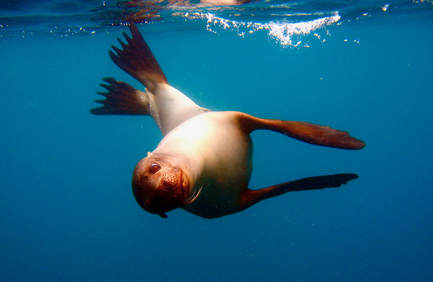Canada’s Oceans: Towards 2020 Symposium and Seeing Behind Canada’s Ocean Protection Target2/21/2018 By Erin Leigh Johnson This past December I attended Canada’s Oceans: Towards 2020 symposium at the Royal Ontario Museum (ROM) in Toronto. This special symposium brought together Canadian ocean scientists, government officials, indigenous leaders, filmmakers and marine conservationists to discuss the critical problems our oceans face, and to explore the initiatives Canada is taking to address them. It was a follow-up to the ROM’s Canada’s Ocean and You event, which I also attended five years ago. But five years later, the oceans’ many problems have not changed. There’s still plastic pollution. Yet now, the issue has escalated. More and more tiny microplastic beads are polluting the oceans; they have even found a new home in our table salt. Our fleece sweaters are shedding plastic microfibers off in the wash, which then flow through our water systems and into the oceans. Overfishing too still remains a severe global issue. It puts the future of food security and incomes of many at risk. The symposium title, Canada’s Oceans: Towards 2020, refers to Canada's target to increase its marine and coastal protected areas by 10% by the year 2020. But is this target as good as it seems? While the symposium did not discuss the regulations of Marine Protected Areas, they are still an important factor to consider. The largest-to-date proposed Marine Protected Area in Canada is the Laurentian Channel. It is an underwater valley in eastern Canada that has humpback whales, porbeagle sharks, leatherback sea turtles and other incredible marine life. Yet in 80% of this proposed protected area, oil and gas drilling activities will be permitted. How is this ocean protection? Proposed regulations such as this one need to be addressed. Marine Protected Areas with loopholes like these will not provide adequate protection for the marine life and precious environment they maintain. What the Symposium panellists did discuss were the many exceptional projects that are improving the state of the oceans. Some of these include non-destructive fishing gear, improved fisheries management and the ban of plastic straws from Tofino, a city in British Columbia. Panellists also gave tips on how individuals can help conserve the oceans. People can write to parliament and buy seafood labelled “sustainably certified”. These labels ensure the seafood was caught using methods that are non-detrimental to the environment, and are from managed fisheries that do not support overfishing. One of the things the symposium repeatedly emphasized was the need for us to become much better communicators of science and ocean issues. But how? How will we become communicators of these complicated issues, issues that are unimportant to many in our society? For me, the answer lies in thinking outside the box. We need to learn from industries different from our own: from marketers, from filmmakers, comedians and investors to name a few. These experts have different skillsets, which could help us effectively communicate ocean issues with new perspectives and insight. By collaborating, we could create innovative marketing plans, outreach programs and solutions to conserve the oceans. Just think of what we could accomplish by looking through a different lens. And with that, I challenge all of us to step outside our boxes and learn a skill from a different industry, whether it is in marketing, business, finance, media, etc. We need the perspectives and innovative solutions that this kind of collaboration can provide to conserve our oceans. Erin Leigh Johnson has a Bachelor of Science in Marine Biology and is a PADI Rescue Scuba Diver. She has worked as a researcher on three seasons of The Water Brothers, an award-winning documentary series about marine conservation and freshwater issues around the world. She has also given lectures about marine conservation issues aboard the luxury cruise line, the Paul Gauguin. Erin is very passionate about marine conservation issues and ocean stories.
1 Comment
|
ELB MembersBlogs are written by ELB members who want to share their stories about Ontario's biodiversity. Archives
January 2023
Categories
All
|


 RSS Feed
RSS Feed